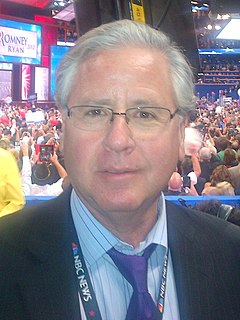A Quote by Christopher Hitchens
If I'm in a political argument, I think I can, with reasonable accuracy and without boasting, put the other person's side of the case at least as well as they could. One has to be able to say that in any well-conducted argument.
Related Quotes
The compelling argument is on the side of homosexuals. We're Americans. We just want to be treated like everybody else. That is a compelling argument. And to deny that, you've got to have a very strong argument on the other side. And the other side hasn't been able to do anything but thump the Bible ... I support civil unions, I always have. All right, the gay marriage thing, I don't feel that strongly about it one way or the other.
There are two kinds of comprehensive doctrines, religious and secular. Those of religious faith will say I give a veiled argument for secularism, and the latter will say I give a veiled argument for religion. I deny both. Each side presumes the basic ideas of constitutional democracy, so my suggestion is that we can make our political arguments in terms of public reason. Then we stand on common ground. That's how we can understand each other and cooperate.
The usefulness of religion - the fact that it gives life meaning, that it makes people feel good - is not an argument for the truth of any religious doctrine. It's not an argument that it's reasonable to believe that Jesus really was born of a virgin or that the Bible is the perfect word of the creator of the universe.
I shall not convert you at the end of my argument. I think the argument is sound. I hold that belief in God is not merely as reasonable as other belief, or even a little or infinitely more probably true than other belief; I hold rather that unless you believe in God you can logically believe in nothing else.
The notion that somehow or another they'll (Iran) put it in a picnic basket and hand it to some terrorist group is merely an argument that may be convincing to some people who don't know anything about nuclear weapons. I don't find that argument very credible, I'm not sure that people who make it even believe in it. But it's a good argument to make if you have no other argument to make. The fact of the matter is, Iran has been around for 3000 years, and that is not a symptom of a suicidal instinct.
But to look back from the stony plain along the road which led one to that place is not at all the same thing as walking on the road; the perspective to say the very least, changes only with the journey; only when the road has, all abruptly and treacherously, and with an absoluteness that permits no argument, turned or dropped or risen is one able to see all that one could not have seen from any other place.
If you go to the right conservative places you'll find there's a huge argument about this among conservatives, particularly the conservative elites and the conservative intellectuals. There's always an argument among our people over who's the smartest person in the room and they're always trying to outsmart each other with the fanciest smartest most obscure argument. The fact is these arguments are taking place within the conservative movement I think quite a lot.

































